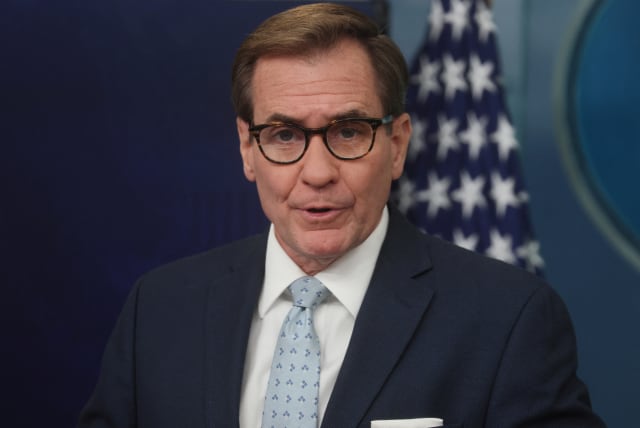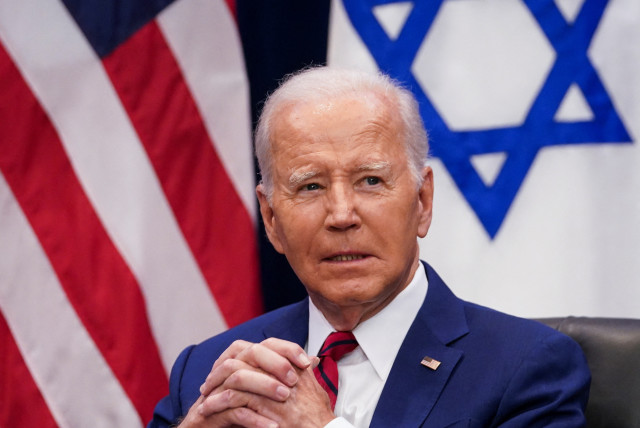White House: We haven’t set deadline to end Gaza war

Deputy National Security Advisor Jon Finer said the US hadn't set a deadline for Israel to finish ousting Hamas as the UNSC was set to vote on an immediate ceasefire.
The United States has “not given a firm deadline to Israel” to end its military campaign to oust Hamas from Gaza, and if the war ended now, the Islamist group would continue to pose a threat, Deputy National Security Advisor Jon Finer told the Aspen Security Forum on Thursday.
He spoke as the United Nations Security Council, with the support of the European Union, was set to vote on a call for an immediate ceasefire and the UN has warned that the system of humanitarian aid distribution in Gaza has collapsed.
US President Joe Biden spoke with both Prime Minister Benjamin Netanyahu and Jordan’s King Abdullah about the Gaza war on Thursday night.
King Abdullah calls again for an immediate ceasefire
In their conversation Jordan’s King Abdullah called “for an immediate ceasefire in #Gaza and the protection of civilians, stressing the importance of maintaining close coordination and exerting efforts to end the war and reach peace,” the Royal Hashemite Court said.
US National Security Council spokesman John Kirby told reporters at the White House that there were talks for a deal that would allow for a pause in the Gaza war and for a deal to release the remaining 138 hostages in the enclave.
Israel and Hamas are “not close to inking another deal on a humanitarian pause, nor on a hostage release,” Kirby said. The hostages in Gaza are not all held by Hamas and they are not all held together, he explained, adding that in some cases they are also being moved from location to location.
Israel has said that its sustained military campaign is the best way to ensure the release of the hostages. But the international commuting has focused on the high death toll, with Hamas asserting that 16,000 Palestinians have been killed in war-related violence. Israel has said that 5,000 of them were Hamas terrorists.
At a press conference in Geneva, Under-Secretary-General for Humanitarian Affairs Martin Griffiths warned that the system of delivering humanitarian aid in Gaza had collapsed.
“We do not have a humanitarian operation in southern Gaza that can be called by that name anymore. That the pace of the military assault in southern Gaza is a repeat of the assault in northern Gaza. That it has made no place safe for civilians in southern Gaza, which had been a cornerstone of the humanitarian plan to protect civilians and thus to provide aid to them. But without places of safety, that plan is in tatters.”
Netanyahu on Thursday set his sights on the North, as he warned Hezbollah not to initiate a third Lebanon war with Israel, hours after an Iranian proxy group guided missile attack killed a 60-year-old Israeli man in northern Israel.
“If Hezbollah chooses to start an all-out war, then it will single-handedly turn Beirut and South Lebanon, not far from here, into Gaza and Khan Yunis. We are determined to bring victory, and we will do it with your help,” Netanyahu said.
He spoke during a visit to the IDF’s Northern Command Headquarters together with Defense Minister Yoav Gallant and IDF Chief-of-Staff Lt.-Gen. Herzi Halevi and the head of that sector Maj.-Gen. Ori Gordin.
Netanyahu and Gordin then visited an artillery battery in the Upper Galilee, where they spoke with soldiers who have been serving on the northern border.
“I am here with reservists who are showing great spirit in their readiness for battle, to complete the job, to restore security, not only in the south but also in the north. This is our commitment,” Netanyahu stated.
“We are determined to achieve victory and we will do so with your help,” he told the soldiers.
He visited the north as diplomatic efforts continued to contain the violent cross-border incidents to ensure they were not transformed into an all-out war, which would see Israel fighting on two fronts.
The IDF has been engaged in a military campaign to oust Hamas from Gaza, following the terror group’s infiltration of southern Israel on October 7, in which it killed over 1,200 people and seized another 250 hostages.
Israel immediately evacuated the northern community after October 7 to ensure that Hezbollah did not carry out a similar attack against Israelis in the north.
Reuters contributed to this report.
Jerusalem Post Store
`; document.getElementById("linkPremium").innerHTML = cont; var divWithLink = document.getElementById("premium-link"); if (divWithLink !== null && divWithLink !== 'undefined') { divWithLink.style.border = "solid 1px #cb0f3e"; divWithLink.style.textAlign = "center"; divWithLink.style.marginBottom = "15px"; divWithLink.style.marginTop = "15px"; divWithLink.style.width = "100%"; divWithLink.style.backgroundColor = "#122952"; divWithLink.style.color = "#ffffff"; divWithLink.style.lineHeight = "1.5"; } } (function (v, i) { });

